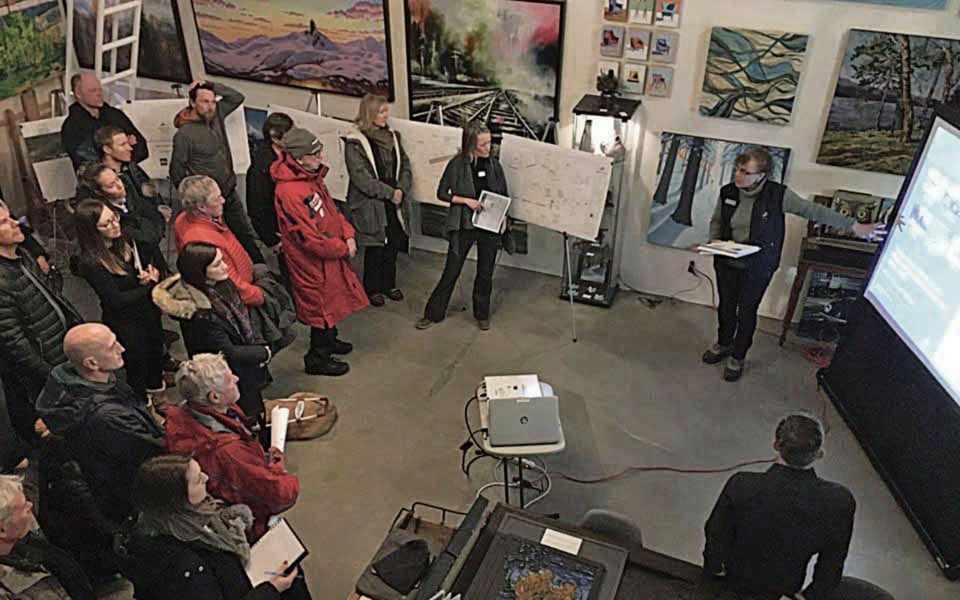In a first for the organization, the Resort Municipality of Whistler (RMOW) has completed a formal review of its community engagement practices, identifying a number of ways to improve the public’s accessibility to important municipal information and build trust in the community.
“It really gives us an opportunity to step back, to check in and provide some guidance for our way forward,” explained Michele Comeau, manager of corporate projects, during the Oct. 6 regular meeting of council.
“I wouldn’t characterize it as replacing the engine, but perhaps doing a major tune-up.”
With municipal transparency a hot-button issue in the 2018 municipal election, one of Whistler council’s first orders of business was to strike a Governance and Ethics Committee tasked with enhancing public engagement. Now, that committee has come back with two separate reports: the Community Engagement Review (CER), and a Community Engagement Policy (CEP), the first such formal policy the municipality has put in place.
Drawing on an “external scan” of best practices and key engagement trends, as well as an internal review of the RMOW’s policies and procedures, the CER includes more than two-dozen recommendations that vary in scope and timeline.
“There are nearly 30 recommendations in the report and they range from tactical, very kind of practical, smaller recommendations to broader, more foundational items that are more long-term and resource-heavy,” Comeau said, adding that in some cases, the recommendations touch on work that is already underway.
Several of the recommendations centre on improving the public’s accessibility to what is often complex municipal information, including the creation of a centralized corporate document library, a single website landing page with all of the ongoing opportunities for engagement listed, and making content from council meetings easier to search and navigate digitally. Another suggests providing easy-to-understand information on required municipal engagement procedures, such as public hearings and land use and development protocols, “because they can be quite complicated and are very important part of our business and very important to our community,” Comeau said.
The RMOW is also exploring different digital tools through which to engage the community, an approach that has only grown in relevance during the COVID-19 pandemic.
“Technology is advancing so quickly and people are embracing it a little bit more and getting more comfortable with it,” said Councillor John Grills. “I find it a really interesting time to be doing this work given the current parameters we’re having to live in with Zoom and [online] council meetings and so forth.”
Ultimately, the municipality wants to reach not only a greater number of people, but a wider diversity of community members.
“One of the areas of doing this is increasing the coordination of engagement activities,” Comeau added. “So, for example, instead of having multiple open houses or multiple checkpoints on specific projects, perhaps we can bunch some of those together, which saves time for people participating and hopefully would increase participation in some cases. Some projects may require their own engagements but there are times when we can bundle things together.”
The CEP, meanwhile, will give municipal staff and elected officials guidance on when and how to engage with the community, providing a road map for improving decision-making and public trust.
The reports come on the heels of Whistler’s annual Community Life Survey, which once again showed a lack of faith in local officials, with just 49 per cent of respondents saying they believe municipal decision-makers have the community in mind when making decisions, which was in line with 2019’s results.
It should be noted, however, that public trust in local government has generally been on the downswing across the board; a 2015 survey, for example, found that only 53 per cent of respondents in other benchmark communities had trust in decision-makers, slightly lower than Whistler’s average score over the 13 years the question has been posed.
That trend has been coupled with an increasing desire from the public for more direct, meaningful engagement—not to mention the growth of social media as a source for news and information.
“It’s an amazing channel, but it also presents some challenges with volume, and in some cases, misinformation,” Comeau noted.
Next steps will include the completion of an engagement guide and toolkit for municipal staff and elected officials, as well as a phased implementation plan.
“I think we’ve accomplished something that is really key to furthering the connection to the people who pay the bills,” said Coun. Cathy Jewett.
To view the full report, visit whistler.ca/municipal-gov.




